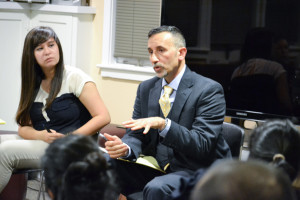A Stanford student suffering from an eating disorder sought treatment at Counseling and Psychological Services (CAPS) at the beginning of fall quarter. After waiting several weeks, she received confirmation to begin attending weekly therapy sessions. At the start of each appointment, she was weighed in wearing a hospital gown and told to urinate in a cup for tests. After passing these checkpoints, she spent the rest of the appointment talking to a therapist CAPS had assigned to her.
However, the student said she did not find these sessions supportive. The therapist asked her vague questions like, “How are you doing?” and “What are you eating?” After answering these questions, the student said most of the counseling consisted of general advice.
“My therapist would tell me to allow myself to eat certain foods or suggest that maybe I don’t need to exercise all the time,” she explained. “I knew those things, but that doesn’t mean that I could act on them.”
The student said she did not know what other resources were available to treat eating disorders on Stanford’s campus.
The CAPS website provides a link to information about eating disorders, but most of this information is relatively general, with claims that “proven approaches can effectively prevent, reduce, or stop troublesome behaviors while helping people develop new and positive ways of coping with underlying feelings.”
Director Ron Albucher said CAPS approaches eating disorders from a broad scope.

“Due to the complexities and potential medical consequences of eating disorders, CAPS uses a multidisciplinary approach to treat these illnesses,” he said in an email to The Daily. “A special care team composed of medical doctors, dieticians and psychotherapists meets weekly to discuss and manage cases.”
The CAPS website also provides a link to take a self-assessment about risk of disordered eating, but this leads to a psychological study conducted by Stanford Medicine and requires the user to agree to participate in “a research study of an Internet-based program for eating disorders” in order to proceed with the assessment.
According to the study’s claims, this program could last up to two years and potentially involves an eight- to 10- week intervention. A disclaimer lists multiple organizations that are authorized to publish patients’ health information, including the Office for Human Research Protections in the U.S. Department of Health and Human Services, the Stanford University Administrative Panel on Human Subjects in Medical Research and ThriveOn, a company offering the technical services for the study.
Though this study could provide helpful information about combatting eating disorders, some students expressed concern that it was a large commitment for those who were simply hoping to determine whether they should seek professional help regarding eating habits.
One Stanford freshman who was worried about her relationship with food wanted more information but did not want to agree to be part of a psychological study.
“I was scared some of my obsessive tendencies could evolve into an eating disorder, so I looked for help at Stanford online,” she said. “When I found out what CAPS’ risk test involved though, I actually became more stressed. I didn’t even know if I actually had a problem, and they’re asking me for a large chunk of my time at Stanford to some study I know nothing about.”
The website also states that patients can be outsourced to professionals from the Lucile Packard Children’s Hospital’s Comprehensive Eating Disorders Program. This involves additional referrals, especially if the student has private health insurance and not Stanford’s Cardinal Care.
Albucher explained why Stanford works so closely with the hospital’s program.
“They have regular clinic hours at Vaden weekly and join us in our eating disorder care team meetings,” he said. “They also provide hospitalization for students who are medically unstable and need a higher level of care than can be provided in a clinic setting. This type of specialized comprehensive inpatient care program for eating disorders is not available at Stanford Hospital.”
Though this addresses emergency instances, students with eating disorders that do not currently demand hospitalization have experienced difficulties when trying to schedule appointments. After an initial intake call, CAPS schedules appointments and assigns therapists to students, but in some cases, patients with eating disorders have not been able to meet with therapists who specialize in eating disorders.
One student struggling with severe anorexia during her sophomore year highlighted her frustrations through The Stanford Review’s “CAPS Confessions” forum.
“When I went in [to CAPS], I nervously explained my eating disorder to the counselor,” the student wrote. “He told me that [he] was not the eating disorder specialist (he specialized in working with LGBT students) and that I would have to make another appointment with a different doctor.”
The entire section of CAPS devoted to treating eating disorders only offers appointments to students on Wednesday mornings, when many students have class and other commitments.
A freshman interviewed by The Daily who hoped to continue treatment for her eating disorder when she started at Stanford also described several setbacks. Since this student was currently in recovery and not underweight, she said that the therapists were unable to successfully counsel her when she was not an immediate danger to herself.
“They know what to do when you’re physically unwell, but not how to get past the mental block [of having an eating disorder],” she said.
She also reported feeling uncomfortable expressing any problems she might still have because CAPS seemed so ill-equipped to deal with the mental aspect of eating disorders. Eventually, because of this and the difficulty of scheduling appointments, she said she stopped meeting with CAPS altogether.
Another student shared similar sentiments about CAPS’ apparent inexperience in dealing with eating disorders. She was horrified when her therapist expressed shock that she had only purged twice in the past three months. She said the therapist’s offhand comment caused a strong reaction.
“In my warped, disordered mind, I assumed that meant I was not ‘sick enough’ to be worthy of treatment,” she said.
After that session, the student’s symptoms escalated, “triggered by the therapist’s statements.” The patient said the therapist’s callousness and failure to tackle the mental dimensions of eating disorders actually increased the severity of the patient’s issue.
Several students interviewed also conveyed fear over the possibility of being forced to take time off from Stanford because of an inability to recover from an eating disorder or to reach a healthy weight. CAPS does qualify that this is only in extreme cases when the student’s life or health are at risk. At Stanford, students can undergo intense academic strain, and it can be difficult to receive proper treatment.
“In these cases, it is advantageous for a student to take time off to focus on their illness, rather than struggling at school and risk having physical complications,” Albucher said. “Students are able to come back when they are healthy and successfully resume their studies and/or take reduced course loads to support their recovery.”
However, though Stanford is supportive of students who need to time to recover before resuming as students, better programs and counseling could allow students to get the help needed before cases become this extreme.
The ASSU Executive Team on Mental Health has not developed programs designed specifically for eating disorders, but one of the heads of the task, Nikita Desai ’15, expressed hope that the group’s efforts will lead to better overall treatment at Stanford, including for eating disorders.
“Several of our initiatives are meant to improve availability, access to and awareness of resources and services for treating eating disorders, among other mental health conditions,” Desai explained in an email.
Lark Trumbly, a member of the ASSU Task Force on Mental Health and a Daily staffer, said there is a general lack of resources to address eating disorders on Stanford’s campus.
“Eating disorders are a pretty big thing on this campus,” Trumbly said. “I know several people who have had them, and none got help on campus.”
In order to improve all programs at CAPS, Trumbly said funding would need to increase dramatically.
“The space at Vaden isn’t big enough to cater to the people who may need to seek treatment,” Trumbly said.
Trumbly said she hopes funding and additional resources could start to reform programs like CAPS and help address eating disorders on Stanford’s campus.
After a town hall meeting centered on CAPS on Feb. 25, Albucher confirmed to The Daily that CAPS was indeed understaffed and underfunded. He acknowledged that this contributed to some of the delays and problems voiced by attendants of the meeting.
The recently finalized budget plan for 2015-2016 has allocated more funding for CAPS, according to Albucher.
Contact Sophie Stuber at [email protected].
